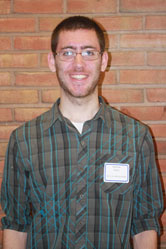Major: Chemical Engineering
“Optimization of a Process: Are Algae-based Biofuels the Solution to the Energy Crisis?”

With the price of crude oil steadily growing, a search for the next generation liquid fuel that can replace dependence on crude oil is essential. For some time corn and other plant-based biofuels have been in the forefront of this search, but scientists are discovering problems with these alternatives that cripple their sustainability. Recently, algae-based biofuels have entered the spotlight and are believed to be a potential alternative. While algae as an alternative fuel source is promising, little analysis of an industrial-sized plant has been performed. This research project will provide a critical analysis on whether a pilot algae-to-biofuel plant is currently feasible. The plant will be modeled with Aspen Plus, a powerful chemical process simulator. The unit operations that make up the basic pieces of a production plant will be included in the model and optimization techniques will be applied to individual components and to the processing plant as a whole. Our results will be evaluated through both comparison to other plant designs and analysis of the best energy output per energy input for the process.
How did you find your mentor for year research, scholarship, or artistic project?
I took a course with my mentor, and during one of the classes she strongly encouraged students who wanted to go to graduate school to seek out on-campus research. I talked to my mentor right after class, and it turned out we had similar research interests.
How did you know this was the project you wanted to do?
I am hoping to do research in the field of alternative energy in graduate school while I pursue a Ph.D. I knew doing alternative energy research at UMBC would better prepare me for graduate school.
Do you get course credit for this work? How much time do you put into it?
I don’t get credit right now. Maybe in the future, though! I work 10 to 20 hours a week in the lab.
How did you hear about the Undergraduate Research Award (URA) program?
The mentor I am working with has had URA scholars work with her before, so she encouraged me to apply.
Was the application difficult to do?
Not at all. Some aspects of the application were time consuming, but it wasn’t difficult. It was definitely worth my time!
How much did your mentor help you with the application?
My mentor was very helpful. Since she has had URA scholars work with her before, she knew a lot of what went into a solid application. I wrote the application, and then we went through the application together. She was able to point out areas in the application that needed to be strengthened. After several drafts, we had a really solid application.
What has been the hardest part about your research?
The time commitment. As a full-time student in an extremely demanding major and a member of a couple of clubs, balancing time has always been a challenge. Research was the priority and so I had to cut back on a lot of extra-curricular activities.
What was the most unexpected thing?
The most unexpected good thing was how much fun research is. I know it’s a cheesy answer, but it’s true. In just preparing for research, I have learned a lot of cool things relating to my field of interest.
The most unexpected negative thing was how long it takes to get results. When I started, I looked at all the different steps and said to myself “Yeah, I’ll have this project done by the end of the semester.” I was mistaken! More than a semester later I am maybe halfway done with my project!
How does your research relate to your work in other classes?
My research directly uses ideas, problem solving strategies, and equations I have been learning in my classes, especially my major-specific classes. It also is preparing me for work I will be doing in future classes!
What else are you involved in on campus?
In the past I have been in leadership positions in both Intervarsity Christian Fellowship and the UMBC Humans vs. Zombies club, although I am currently only a member in these clubs.
What is your advice to other students about getting involved in research?
To all the people who think they’d like to get involved in research, but haven’t done it yet: Just do it. It’s totally worth it. Talk to advisors, professors, and mentors about how to make your research be more than just a good experience that beefs up your resume. You can easily get class credit and funding for on-campus research if you search for it.
Lastly, find research you want to do. Research can be challenging at times, and if you’re doing something you hate, it will be harder through those tough times. If you like your research, then you will find the challenges become puzzles (fun!) rather than problems.
What are your career goals?
My long-term goals are to do alternative energy research and development in a corporate setting. After graduating from UMBC, I plan to pursue a Ph.D. in the field of alternative energy.
Did you transfer to UMBC from another institution? Where?
Yes, I did! I spent two years at Montgomery College (both Germantown and Rockville campuses) before I transferred to UMBC. I actually met several UMBC students the summer before I transferred through an internship at the National Institute of Standards and Technology (NIST) in their SURF program.
5/18/2023